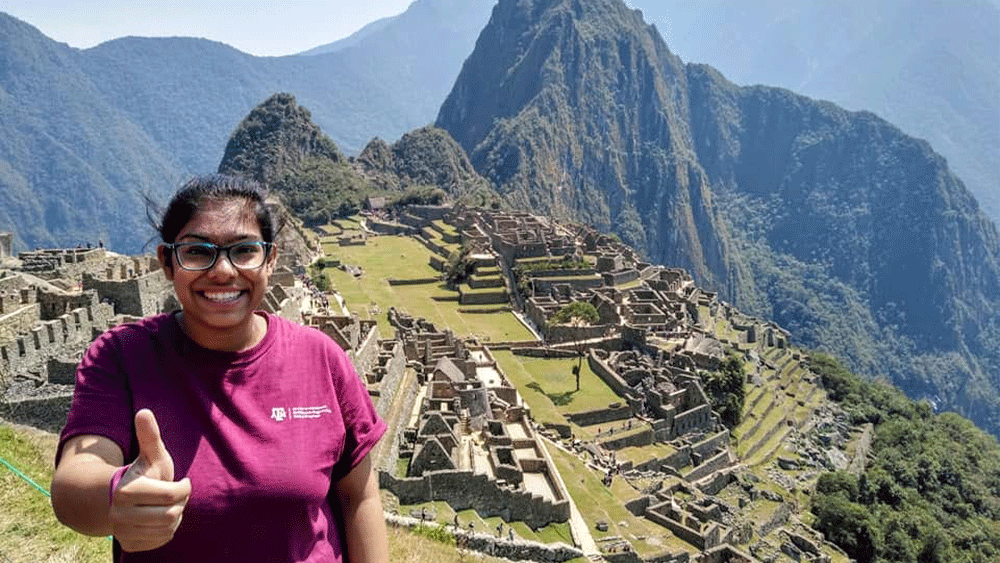
While a cookbook can explain how to make authentic paella from Spain, and a quick Google search can provide you with the history of the Leaning Tower of Pisa, there is no greater way to gain knowledge of the world than through experience.
Halliburton Engineering Global Programs, offered by the College of Engineering at Texas A&M University, hold fast to that belief. And although the COVID-19 pandemic has left lasting impacts, the gradual return of international travel creates opportunities for students interested in studying abroad.
“We want our students to develop global competency,” said Dr. Maria Claudia B. Alves, senior director of global programs. “For us, this means the ability for engineering students to embrace cultural norms and expectations different from their own, work inclusively and effectively with diverse populations and develop cultural self-awareness. An engineer with global experience can consider multiple perspectives to create engineering solutions and adapt appropriately to global contexts. That global awareness, flexibility and adaptiveness will guide them through their engineering courses and careers.”
Halliburton Engineering Global Programs offers a wide range of culturally and academically diverse experiences that are integrated into the degree plan of the engineering students ranging from research-focused trips to internship opportunities that showcase the internationality of engineering.
One such initiative is the exchange program. Through partnerships with universities around the world, from Denmark to the United Kingdom, exchange students complete an entire semester at one of the various connected institutions. While taking necessary steps toward their desired degrees, participants can delve into another country’s culture and history.
Additionally, Texas A&M hosts students from universities worldwide, cultivating an environment where differences are regarded as assets. Students are welcomed into the Aggie community and given the tools and resources necessary for a successful semester.
An alternative option is a Texas A&M faculty-led engineering course. For this program, students travel to another country for several weeks to take a required course toward their degree. The program includes technical visits related to their major, cultural visits, small class sizes, a living-learning community environment and free time for exploration.
On a global engineering field trip, students are immediately immersed in an introductory research experience with a select group of individuals. Partnered with the Yucatan Initiative Project, students and faculty are given access to institutions throughout Mexico. Students are presented with a pressing research problem and required to submit and present a proposal. Through funding support from The Texas A&M University System Louis Stokes Alliance for Minority Participation, this opportunity is available for first-generation minority students.
Engineering global programs also received the 2021 Global Engagement Grant from Texas A&M. Through this grant, students collaborate with others from the College of Business, the College of Geoscience and the College of Agriculture at Texas A&M.
“The beauty for our students will be working in interdisciplinary teams on global projects,” said Alves. “When they dig into a research problem, they will be communicating with students from varying backgrounds to find a solution through a holistic point of view.”
The global programs office also provides an international internship option for those interested in kickstarting their industry experience. A program that lasts from eight to 10 weeks, many opportunities involve direct projects with researchers or companies globally, resulting in real-world projects.
Before students take off on international adventures, they are required to participate in the pre-departure workshop called Raising Your Cultural IQ. This preprogram workshop has students reflect on their experiences while preparing them for the challenges of global traveling. The program provides tools for developing their professional skills through methodologies that encourage critical thinking, communications, teamwork and problem-solving.
New to the cultural IQ program is an industry panel that will answer questions regarding how global competency has enhanced their careers.
With multiple choices to navigate, global ambassadors like Jainita Chauhan, student in the Wm Michael Barnes ’64 Department of Industrial and Systems Engineering, can attest to the impact of these experiences. Stumbling upon global programs through the website, she took a leap of faith and packed her bags. A daughter of immigrants, Chauhan wanted to learn more about the world surrounding her. After her first global experience in Peru taking an engineering course, she fell in love with travel and has since been involved in various programs.
“Even with a multicultural background, global programs changed my perspective on international travel,” said Chauhan. “As global-minded engineers, we must be comfortable with overcoming cultural barriers. But the courses are only a small part of learning abroad. The main purpose is to gain international exposure, see different cultures and meet many unique people with differing attitudes and personalities that you would never meet without these opportunities.”
Alves is continuing to grow and promote these programs for the benefit of all students. The recent recipient of the Fulbright U.S. International Education Administrators award for France, she is using the grant to create valuable connections and learn about the nuances of different educational systems. She continues to use this knowledge to amplify the significance of global programs at Texas A&M.
“We are highlighting the importance of globally competent engineers by integrating the learning outcomes that we expect our students to have by the time they graduate into a study abroad experience,” said Alves. “In a tangible way, participants can understand the value of our programs in their future careers.”